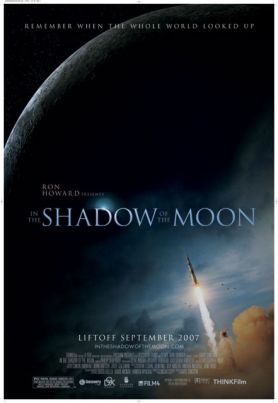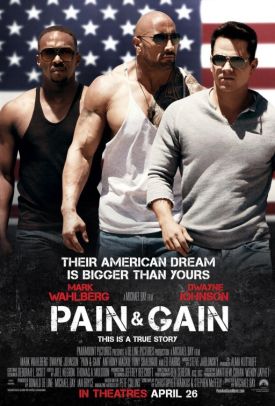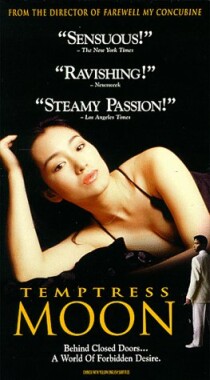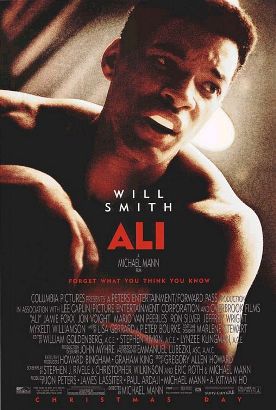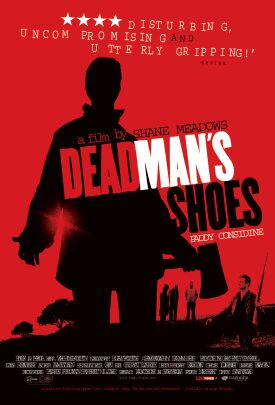In the Shadow of the Moon
Astronauts stand at the meeting point of heroism and celebrity. Like other explorers, they have to their credit genuine, real-world accomplishments that take guts as well as know-how and talent. But although they go into space as representatives of a country, although it takes a quasi-military organization like NASA to get them there, they are seen as individuals. One of the astronaut-subjects of David Sington’s In the Shadow of the Moon tells of how, after he had gone to the moon, everywhere he went, in every country, people would say not “you” — that is America — “did it” but “we” — that is the whole human race — did. That’s the hallmark of the celebrity. He makes his audience a participant in his fame.
Yet the film is not a celebrity vehicle but celebrates real heroism and a consciousness of the heroic — as when Eugene Cernan speaks of his feelings of guilt about missing out on Vietnam when so many of his fellow naval aviators had to fly and fight and die or be captured there: “Whatever the rights and wrongs of it, that was my war. They were my buddies. . . They fought my war for me.” But most of their appreciation of the heroic is in relation to each other. Captain Cernan was the last man to walk on the moon. Neil Armstrong, the first, does not appear — his refusal to give interviews adds to the air of heroic mystery about him — but he is clearly regarded as a hero by the others.
Charlie Duke speaks of him almost with awe as “Dr. Cool” and remembers an occasion when, after almost being killed in a sudden bail-out from the prototype lunar lander, Armstrong immediately went back to his cubicle and shuffling papers. Just another day at the office. “That’s what you had to do,” says General Duke. “The mission goes on.” Like all true heroes, these men admire the heroism of others while being modest about their own. Alan Bean says his heart-rate on launch shot up to 140 while John Young’s stayed at a steady 70. “I was too old for it to go any faster,” Young comments.
It’s Alan Bean who, along with Charlie Duke and Michael Collins, has the most to say about his experience, and he says some of the most interesting things. He notes, for instance, that after Tom Wolfe’s The Right Stuff came out he was amazed. “I’m the same guy I always was, but now I’ve got The Right Stuff!” Later, it’s Captain Bean, too, who says of Neil Armstrong’s pushing the limit on the lunar lander’s fuel in order to find a place to land on that first mission. “No astronaut is going to say, ‘I got low on fuel and decided to turn around’,” he says. “No astronaut is going to do that. It wouldn’t be the right stuff.”
To some it will seem a telling detail that, at least to this extent, the astronauts learned how to be astronauts from Tom Wolfe — just as (so we are told by “The Sopranos” anyway) mafiosi have learned how to be mafiosi from Mario Puzo and Francis Ford Coppola in “The Godfather.” But heroism is always a collaboration between the heroes and those who tell their stories. How would we even know what heroes were without the tradition of heroic narrative going back to Homer? These astronauts also still see themselves as part of a larger heroic narrative that was set in motion in May, 1961, when President Kennedy said, “I believe that this nation should commit itself to achieving the goal, before this decade is out, of landing a man on the moon and returning him safely to the Earth.”
Although Kennedy said in the same speech that “we go into space because, whatever mankind must undertake, free men must fully share,” the speech itself added another reason by its implicit pledge of the national honor to get to the moon — and to get there first. We learn from In the Shadow of the Moon that Apollo 8 in December of 1968 hadn’t originally been intended as a moon shot, but rumors reported by the CIA that the Russians were about to try one made NASA change it to a moon mission, though not yet a landing. It’s also national honor that Charlie Duke has in mind when he speaks of the successful landing and the astronauts’ satisfaction with it as a “great sense of accomplishment for President Kennedy and the nation. We did what we said we were going to do.”
Dave Scott, who was the commander of Apollo 15 in the summer of 1971, makes the very interesting point that in all the science fiction versions of travel to the moon, “I don’t think any of them imagined the whole world watching on TV.” It was that which had the potential to turn the astronauts from heroes into celebrities. We should be grateful that, by and large, they have resisted this temptation. Instead, as one of them so memorably puts it here, they seem to have felt on their return from the moon that people were looking at them and saying: “‘This guy walked on the moon.’ Now I have to uphold that for the rest of my life.” This terrific movie shows us the men, now in their 70s, who have upheld it.
At one point, the film shows a clip from a “CBS Evening News” broadcast from the time of the first moon walk. We see the CBS logo and then, almost immediately, that of the familiar rooster and a voiceover saying, “Brought to you by Kellogg’s!” The preview audience when I saw the film, burst out laughing at this, it seemed so obviously, in the perspective of nearly 40 years’ worth of history, a crass attempt by a commercial organization to bask in the heroes’ reflected glory. That’s rather how I felt by seeing the movie advertised as “Ron Howard Presents.” You didn’t go to the moon, Ron. You didn’t even direct this picture. Take your example of dignity and decorum from the astronauts themselves and don’t try to cash in on their fame.
Discover more from James Bowman
Subscribe to get the latest posts to your email.

